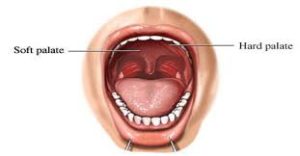Stop Snoring
Written by Dr. Cynthia Horner
Laugh and the world laughs with you. Snore and you sleep alone.
Many of my patients tell me they can’t get a good night sleep because, either they, or their sleep partner snore. Getting seven or more hours of sleep a night is vital to maintaining a healthy weight, thinking sharp, and overall good health. I have had good results with my patients, in helping them to stop snoring.
Snoring is caused by the movement of tissue connected to muscles at the top back of the throat, an area called the soft palate.
These muscles should be toned and taut but as we age these muscles, as well as others in our body become less toned, and responds poorly to the signals from the brain, to contract. There are five muscle in the soft palate, the muscles that contract when we yawn, or shape our throat to hit a high note when singing, are the muscles that lift the soft tissue of the palate. It is these muscles, that lose tone, and cause snoring. You can see your soft palate by shining a light (maybe on your phone) into your mouth while saying ‘aahh’, as you look in a mirror. The soft tissue on either side of your uvula (the thing that looks like a punching bag) is the tissue controlled by the soft palate muscles.
Help to Stop Snoring
I have had good results with my patients, in reducing or eliminating their snoring, by working to tone these muscles. I begin by investigating their brain health, because it all starts with a neuron, in the brain-stem sending messages to the muscles in the soft palate, to contract strong, and on cue. An internet search will tell you, these muscles are innervated by an efferent motor nerve, and an efferent parasympathetic branch of cranial nerve IX (9) and cranial nerve X (10). To make that simpler; specific brain cells, called neurons, in the lower part of the brain send two kinds of messages out of the brain to these muscles. Think of efferent as exiting, exiting the brain, and motor as another word for muscle. Parasympathetic simply refers to the automatic muscle movements that happen when we are not thinking about them. Examples of parasympathetic muscle movements are swallowing and breathing. As people age, this automatic, parasympathetic muscle response in the throat is not always fast and strong, often causing choking when eating or drinking, and even more often – snoring.
Back to how I help people with snoring problems. We work on improving the tone of these muscles at the back of the throat, first by accessing how well the brain is firing. A brain cell needs three things to fire. It needs, oxygen, glucose (sugar), and stimulation. This means it needs: good nutrition, good blood flow to deliver the nutrition and oxygen, and it needs to be asked to work. When accessing brain health I look to see how many ‘Friends of the Brain’ are in place, and how many ‘Enemies of the Brain’ are present.
Friends of Your Brain
- Healthy gut tissue
- Enough protein to grow new cells & repair old cells
- Adequate fat in diet to maintain cells’ outer membrane
- Glucose (a form or sugar) is the only fuel cells use for energy
- Oxygen
- Touch
- Sleep
- Stimulation varied movements and repeated movements
Enemies of Your Brain
- Lack of good microbes in your gut
- Stress
- Lack of sleep
- Trans-fats in the diet
- Sugar in excess, usually in the form of too many carbohydrates that turn to sugar and create inflammation
- Preservatives like BTA (Benzoates)
- Artificial dyes
- MSG and other preservative found in processed foods
- Artificial sweeteners, Splenda, NutraSweet
Once I work with patients to improve their brain health we then begin the second way to improve the tone of the soft palate muscles; this is by stimulation. I adjust the spine in such a way to cause areas of the brain to fire into the brain-stem, so the neurons there fire strong, and on cue. These neurons then do a better job firing to the muscles of the soft palate. The third step is specific exercises of the throat that ‘ask’ the neuron to fire over and over again strengthening the pathways (tracts) between the brain these muscles. Frequency and intensity is important to strengthen the firing of these neurons, and to build strong tracts between the brain and the soft palate muscles. Often patients see improvement in in a few weeks. There are ways to test yourself to learn more about your snoring.
Anyone of any age can improve the tone of their soft palate if there is no disorder or dysfunction of the throat tissue. Please use the contact information under contacts, for more information about beginning your program to stop snoring.
